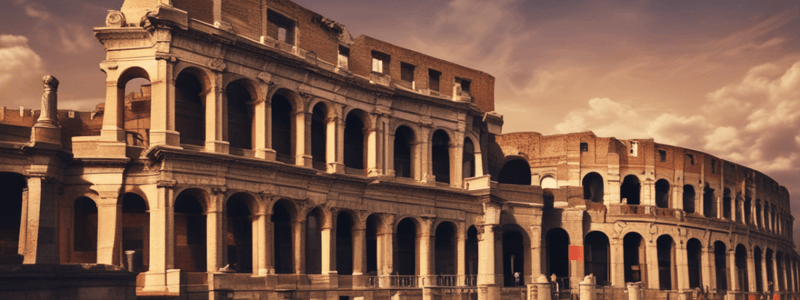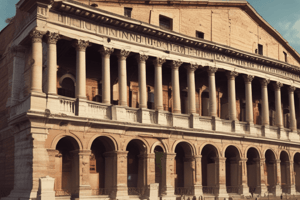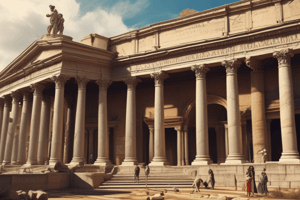Podcast
Questions and Answers
Who was the legendary founder of Rome?
Who was the legendary founder of Rome?
- Remus
- Julius Caesar
- Romulus (correct)
- Numa Pompilious
Who was the first king of Rome?
Who was the first king of Rome?
- Numa Pompilious
- Tullus Hostilius
- Tarquinius Priscus
- Romulus (correct)
Who led Carthage in the Second Punic War?
Who led Carthage in the Second Punic War?
- Hasdrubal
- Scipio Africanus
- Hannibal (correct)
- Cato the Elder
Who ended all of his speeches with 'Carthago delenda est'?
Who ended all of his speeches with 'Carthago delenda est'?
Who was kidnapped by Cilician pirates on his way to college in Rhodes?
Who was kidnapped by Cilician pirates on his way to college in Rhodes?
What was the role of the Vestal Virgins?
What was the role of the Vestal Virgins?
What was the office of pontifex maximus?
What was the office of pontifex maximus?
Who were the Gracchi?
Who were the Gracchi?
Who was assassinated in the building where Julius Caesar was assassinated?
Who was assassinated in the building where Julius Caesar was assassinated?
Which city was founded by Ascanius before Rome?
Which city was founded by Ascanius before Rome?
Who was inspired by Lucius Junius Brutus?
Who was inspired by Lucius Junius Brutus?
Why was the First Triumvirate formed?
Why was the First Triumvirate formed?
Where did Rome suffer their worst military defeat?
Where did Rome suffer their worst military defeat?
Who assassinated Pompey the Great?
Who assassinated Pompey the Great?
What was the result of the Second Punic War?
What was the result of the Second Punic War?
In which modern day country was Carthage located?
In which modern day country was Carthage located?
Flashcards are hidden until you start studying
Study Notes
People
- Romulus, the legendary founder of Rome
- Romulus, the first king of Rome
- Numa Pompilious, the second king of Rome
- Lucius Tarquinius Superbus, the last king of Rome
- Hannibal, the Carthaginian general who led Carthage in the Second Punic War
- Scipio Africanus, the Roman general who won the Second Punic War for Rome
- Scipio Aemilianus, the Roman general who razed Carthage in the Third Punic War
- Tiberius and Gaius Gracchi, the brothers who proposed land reforms
- Cato the Elder, who famously ended all of his speeches, “Carthago delenda est”
- Crassus, the general who put down Spartacus’ slave revolt
- Julius Caesar, who was kidnapped by Cilician pirates on his way to college in Rhodes
- Cleopatra, the famous lover of both Julius Caesar and Mark Antony
- Cato the Younger, a strong opponent of Julius Caesar
- Augustus, the emperor after Julius Caesar
Things
- The founding myth of Rome is the story of Romulus and Remus, twin brothers who founded the city
- The Sabine women were abducted to provide wives for the early Roman settlers
- Numa Pompilious introduced religious and calendrical reforms to Rome
- The Vestal Virgins were a group of priestesses who maintained the sacred fire of Vesta
- The pontifex maximus was the chief priest of Rome
- Rome transitioned from a kingdom to a republic after the expulsion of the last king, Lucius Tarquinius Superbus
- The cursus honorum consisted of the major offices of the Roman Republic, including quaestor, aedile, praetor, and consul
- The Punic Wars fundamentally changed Rome by expanding its territory, increasing its wealth, and establishing it as a dominant power
- The populares were a group of politicians who supported the interests of the common people, while the optimates supported the interests of the aristocracy
- The latifundia were large estates that emerged as a result of the Punic Wars, leading to the displacement of small farmers
- The land reform bills put forward by the Gracchi aimed to redistribute land from the latifundia to the poor
- The “Conflict of the Orders” was a struggle between the patrician and plebeian classes in Rome
- The First Triumvirate was a political alliance between Julius Caesar, Pompey, and Crassus, formed to advance their individual interests
- Ptolemy XIII assassinated Pompey the Great due to fears of Pompey's growing power
- Julius Caesar marched on Rome after being declared an enemy of the state by the Senate
- Marcus Junius Brutus was inspired by Lucius Junius Brutus, who had expelled the last king of Rome
- The Second Triumvirate was a political alliance between Octavian, Antony, and Lepidus, formed to avenge Julius Caesar's death
Places
- Lavinium, a city founded by Ascanius before Rome
- Tunisia, the modern-day country where Carthage was located
- Sicily, the island where Rome and Carthage went to war in 264 BC
- Spain, the country where Carthage began to colonize, leading to the start of the Second Punic War
- Cannae, the site of Rome's worst military defeat, where nearly 50,000 soldiers were lost in one battle
- Gaul, the country conquered by Julius Caesar immediately after serving as consul in 59 BC
- Egypt, the country where Pompey was assassinated
- The Curia of Pompey, the building where Julius Caesar was assassinated
- Egypt, the country where Marc Antony and Cleopatra committed suicide
Dates
- 753 BC: The legendary founding of Rome
- 509 BC: The expulsion of the last king of Rome, Lucius Tarquinius Superbus, and the establishment of the Roman Republic
- 264-241 BC: The First Punic War
- 218-201 BC: The Second Punic War
- 149-146 BC: The Third Punic War
- 133 BC: The year of the land reform bills put forward by the Gracchi
- 100 BC: The year of the Jugurthine War
- 60 BC: The year of the formation of the First Triumvirate
- 59 BC: The year Julius Caesar served as consul
- 44 BC: The year of Julius Caesar's assassination
Studying That Suits You
Use AI to generate personalized quizzes and flashcards to suit your learning preferences.




